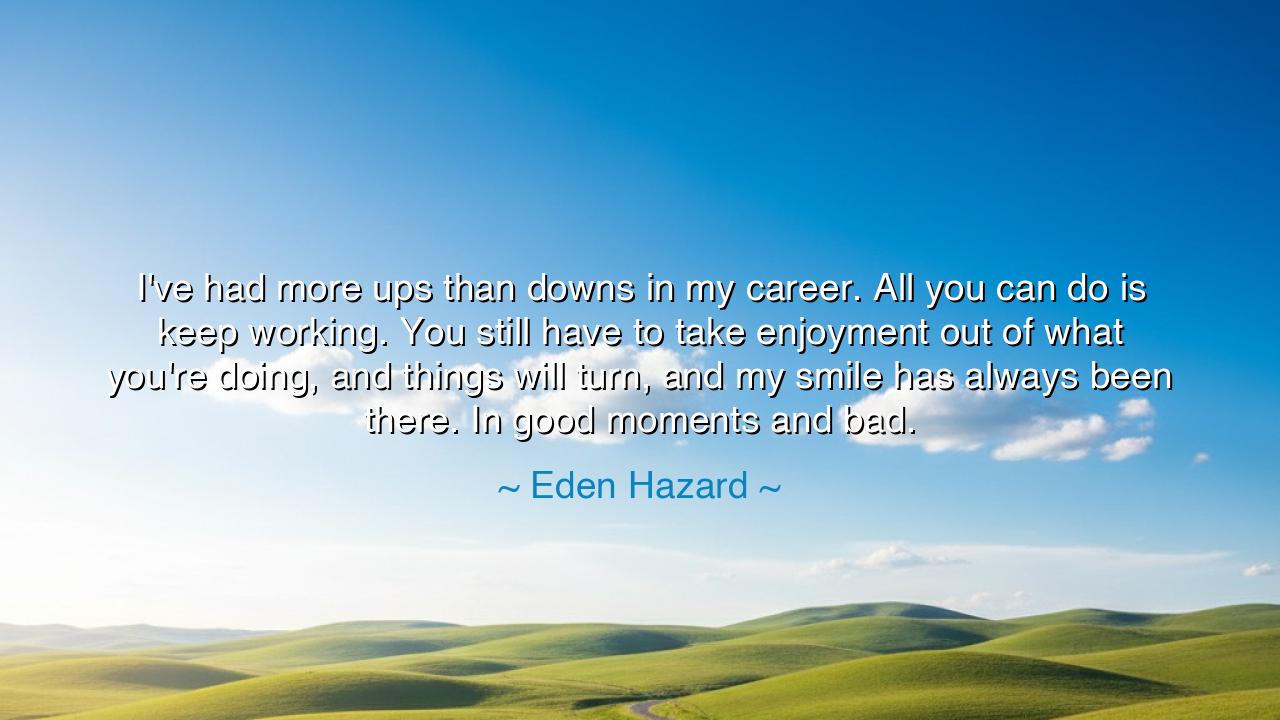
I've had more ups than downs in my career. All you can do is keep
I've had more ups than downs in my career. All you can do is keep working. You still have to take enjoyment out of what you're doing, and things will turn, and my smile has always been there. In good moments and bad.






The words of Eden Hazard carry the quiet wisdom of a man who has walked the long road of triumph and trial: “I've had more ups than downs in my career. All you can do is keep working. You still have to take enjoyment out of what you're doing, and things will turn, and my smile has always been there. In good moments and bad.” These words are not the boast of one who has only tasted victory, but the testimony of one who knows the sweetness of joy and the bitterness of hardship, and yet remains steadfast. They speak to the eternal truth that resilience is not born in success alone, but in the ability to endure and remain joyful through both light and shadow.
To speak of ups and downs is to acknowledge the rhythm of life itself. No man, no woman, no hero of history has known only the sunshine of triumph. Storms always come, defeats always sting, and disappointments always linger. Yet Hazard reminds us that the path of greatness is not to despair in the valleys but to continue climbing. The work itself—the daily labor, the devotion to craft, the persistence of effort—is the bridge that carries one from despair back into triumph. Thus, the true champion is not the one who never falls, but the one who rises again with courage.
History offers many examples of this principle. Consider the life of Abraham Lincoln, who suffered countless defeats in politics, personal tragedy in his family, and the heavy burden of leading a fractured nation. His road was paved with more losses than victories. Yet he continued to labor, to work, and to believe. In time, those efforts turned, and he became one of the most revered leaders in history. Like Hazard’s words, Lincoln’s life teaches that perseverance transforms hardship into legacy.
The heart of the saying lies in the phrase: “take enjoyment out of what you’re doing.” This is the secret to enduring both success and failure. For the one who labors only for the prize will be broken when it does not come. But the one who loves the craft, who finds joy in the game, the journey, the effort itself—that person cannot be defeated. Enjoyment is the eternal flame that burns even when victories fade and struggles weigh heavy. It is the force that allows a man to smile in good moments and bad, knowing that life itself is the true gift.
The smile in Hazard’s testimony is not a mask, but a symbol of resilience. It is the warrior’s grin when he enters the battlefield, not knowing whether he will win but ready to give all. It is the smile of the farmer who plants again after a failed harvest, trusting that the sun will return. It is the smile of one who knows that storms pass, that fortune turns, and that despair cannot last forever. Such a smile is not naivety—it is courage manifest in expression.
The lesson here is profound: in your own journey, you will know both triumphs and defeats. Do not despair in one, nor grow arrogant in the other. Instead, keep working, keep striving, and keep your joy alive. Do not let bitterness steal the enjoyment of your craft, nor let failure rob you of the smile that sustains your spirit. For it is not only your achievements that define you, but the spirit with which you walk through both victory and defeat.
Therefore, let all who hear Hazard’s words carry this teaching into their lives: embrace both the ups and downs with equal grace. Work diligently, find joy in the doing, and let your smile remain unbroken. For in the end, the world remembers not only the trophies you held, but the strength of your spirit, the joy of your presence, and the light you carried in both storm and sunshine. This is the true art of living, the eternal wisdom of resilience, and the legacy of a soul unshaken.






AAdministratorAdministrator
Welcome, honored guests. Please leave a comment, we will respond soon